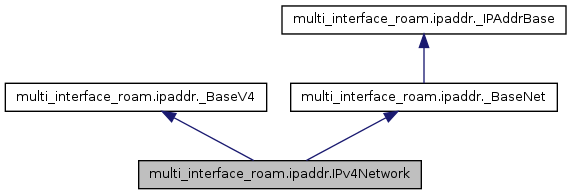Inheritance diagram for multi_interface_roam.ipaddr.IPv4Network:

Public Member Functions | |
| def | __init__ |
Public Attributes | |
| ip | |
| netmask | |
Static Public Attributes | |
| IsLinkLocal = lambdaself:self.is_link_local | |
| IsLoopback = lambdaself:self.is_loopback | |
| IsMulticast = lambdaself:self.is_multicast | |
| IsRFC1918 = lambdaself:self.is_private | |
Private Member Functions | |
| def | _is_hostmask |
| def | _is_valid_netmask |
Private Attributes | |
| _ip | |
| _prefixlen | |
Static Private Attributes | |
| tuple | _valid_mask_octets = set((255, 254, 252, 248, 240, 224, 192, 128, 0)) |
Detailed Description
This class represents and manipulates 32-bit IPv4 networks.
Attributes: [examples for IPv4Network('1.2.3.4/27')]
._ip: 16909060
.ip: IPv4Address('1.2.3.4')
.network: IPv4Address('1.2.3.0')
.hostmask: IPv4Address('0.0.0.31')
.broadcast: IPv4Address('1.2.3.31')
.netmask: IPv4Address('255.255.255.224')
.prefixlen: 27
Constructor & Destructor Documentation
| def multi_interface_roam.ipaddr.IPv4Network.__init__ | ( | self, | |
| address, | |||
strict = False |
|||
| ) |
Instantiate a new IPv4 network object.
Args:
address: A string or integer representing the IP [& network].
'192.168.1.1/24'
'192.168.1.1/255.255.255.0'
'192.168.1.1/0.0.0.255'
are all functionally the same in IPv4. Similarly,
'192.168.1.1'
'192.168.1.1/255.255.255.255'
'192.168.1.1/32'
are also functionaly equivalent. That is to say, failing to
provide a subnetmask will create an object with a mask of /32.
If the mask (portion after the / in the argument) is given in
dotted quad form, it is treated as a netmask if it starts with a
non-zero field (e.g. /255.0.0.0 == /8) and as a hostmask if it
starts with a zero field (e.g. 0.255.255.255 == /8), with the
single exception of an all-zero mask which is treated as a
netmask == /0. If no mask is given, a default of /32 is used.
Additionally, an integer can be passed, so
IPv4Network('192.168.1.1') == IPv4Network(3232235777).
or, more generally
IPv4Network(int(IPv4Network('192.168.1.1'))) ==
IPv4Network('192.168.1.1')
strict: A boolean. If true, ensure that we have been passed
A true network address, eg, 192.168.1.0/24 and not an
IP address on a network, eg, 192.168.1.1/24.
Raises:
AddressValueError: If ipaddr isn't a valid IPv4 address.
NetmaskValueError: If the netmask isn't valid for
an IPv4 address.
ValueError: If strict was True and a network address was not
supplied.
Member Function Documentation
| def multi_interface_roam.ipaddr.IPv4Network._is_hostmask | ( | self, | |
| ip_str | |||
| ) | [private] |
| def multi_interface_roam.ipaddr.IPv4Network._is_valid_netmask | ( | self, | |
| netmask | |||
| ) | [private] |
Member Data Documentation
Reimplemented from multi_interface_roam.ipaddr._BaseNet.
tuple multi_interface_roam::ipaddr.IPv4Network::_valid_mask_octets = set((255, 254, 252, 248, 240, 224, 192, 128, 0)) [static, private] |
multi_interface_roam::ipaddr.IPv4Network::IsLinkLocal = lambdaself:self.is_link_local [static] |
multi_interface_roam::ipaddr.IPv4Network::IsLoopback = lambdaself:self.is_loopback [static] |
multi_interface_roam::ipaddr.IPv4Network::IsMulticast = lambdaself:self.is_multicast [static] |
multi_interface_roam::ipaddr.IPv4Network::IsRFC1918 = lambdaself:self.is_private [static] |
The documentation for this class was generated from the following file: